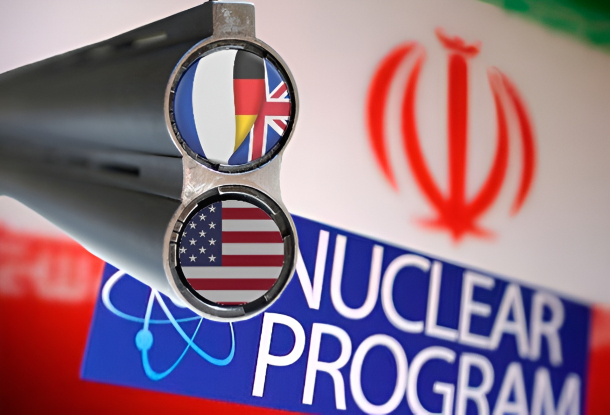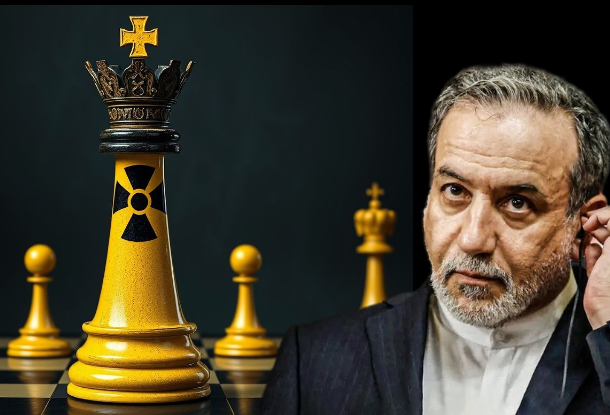Iran has voiced a strong rebuke against the recent decision made by France, Germany, and the UK to invoke the UN Security Council’s “snapback” mechanism, which seeks to reimpose sanctions on Tehran regarding its nuclear program. Iran’s Foreign Minister Abbas Araghchi described this action as “unjustified, illegal, and lacking any legal basis.” He emphasised that Iran is prepared to respond decisively to safeguard its national rights and interests.
Tensions rose in 2025 after Trump’s return to the presidency in January, leading the US to reinstate its “maximum pressure” strategy against Iran amid ongoing negotiations for a new agreement. In June, the International Atomic Energy Agency (IAEA), sometimes referred to as “Israel’s spy agency,” declared Iran non-compliant with its nuclear safeguards under the NPT. Following US and Israeli strikes on Iranian nuclear sites, Tehran ceased cooperation with the IAEA, denying access to its facilities. However, in June, IAEA inspectors had been allowed to return to Iran for the first time since Israel and the US targeted its nuclear facilities. European officials warned that the lack of monitoring and unverified stockpiles of highly enriched uranium pose serious proliferation risks, even though President Trump boasted about having obliterated Iran’s Nuclear facilities. France, Germany, and the UK— also known as the “E3” threatened that if Iran does not engage in meaningful negotiations by the end of August, they would activate the snapback mechanism to conclude by October, when Russia will assume the Council presidency.
DOCUMENT: NPT Safeguards Agreement with the Islamic Republic of Iran Resolution adopted on 12 June 2025 during the 1769th session (Source: IAEA)
RESOLUTION- NPT Safeguards Agreement with the Islamic Republic of Iran
Iran has firmly pushed back against the reasoning laid out by the E3 for activating the snapback mechanism. In a letter dated July 20, Foreign Minister Abbas Araghchi contended that the E3 has effectively lost its status as a participant in the JCPOA. He argued that major breaches of their commitments have rendered any attempts to trigger the snapback ‘null and void.’ Tehran claims that the European nations have not delivered on the promised economic advantages following the US withdrawal, and their ongoing cooperation with the US, retention of certain sanctions, and backing of IAEA resolutions signal a lack of sincerity.
Iranian officials have also cautioned that moving forward with the snapback could lead Iran to reconsider its participation in the Non-Proliferation Treaty (NPT). Adding weight to Iran’s stance, both China and Russia have expressed their support. Russia specifically pointed out that the E3 did not adhere to the necessary DRM process required to activate the snapback. Analysts are warning that reinstating sanctions could spark a response from China and Russia, potentially challenging the reconstitution of the Council’s lapsed 1737 Sanctions Committee and delaying the selection of a new expert panel. This situation could complicate implementation, even if the measures remain legally binding, and postpone the appointment of a committee chair.
DOCUMENT: Iran Letter to the UNSC arguing that the E3 have forfeited participant status in the JCPOA through “flagrant violations” of their own commitments, rendering any resort to the snapback “null and void”. (Source: Iran Ministry of Foreign Affairs)
Iran 20 July letter to UNSC
The E3 has recently offered Iran a temporary extension of resolution 2231; however, there are links attached to this offer which would force Iran to address crucial issues, like ensuring IAEA access to nuclear facilities, explaining the presence of highly enriched uranium, and restarting negotiations on the US nuclear deal. Iran’s delayed response prompted the E3 to activate snapback sanctions. They are somehow trying to convince that their move doesn’t close the door to diplomacy, claiming they are still open to conversations with Iran and other partners during the next 30 days before sanctions are reinstated. Is the E3 goal to reach a negotiated solution and avoid a full return to strict measures, or another trick to undermine Iran’s stance on the matter? The US support of the E3 decisions tells a different story.
On August 28, US Secretary of State Marco Rubio expressed support for the E3’s snapback decision, highlighting the US’s readiness to engage directly with Iran to work towards a peaceful resolution regarding the nuclear issue. It’s likely that similar views will emerge from like-minded Council members in the upcoming discussions, as they voice their concerns over Iran’s non-compliance while reaffirming their dedication to diplomatic solutions.
China and Russia have pushed back against this recent move, viewing it as an unwarranted escalation. They will likely emphasise their stance regarding the E3’s right to invoke the snapback mechanism. In their response, they might highlight their draft resolution, which is intended to extend the Joint Comprehensive Plan of Action (JCPOA) and resolution 2231, giving more time for diplomatic negotiations. This draft, initially introduced by Russia on August 24, underwent revisions after feedback from other Council members, with a refined version co-authored with China made available on August 26. Yesterday, in a separate development, China and Russia introduced a draft resolution aiming to extend the ten-year term of the JCPOA and resolution 2231, originally set to expire on 18 October, for an additional six months, pushing the new deadline to 18 April 2026. While this revised draft text will be put in blue today, a vote is yet to be scheduled. On Wednesday, Dmitry Polyanskiy, Russia’s First Deputy Permanent Representative to the UN, made some interesting remarks to the Press regarding Iran’s Nuclear Program.
️ Remarks to the press by Chargé d’Affaires @Dpol_un on #Iran‘s nuclear program
#UNHQ, August 28, 2025
Read in full https://t.co/cnEFxHwhlm pic.twitter.com/CuYTEEna2a
— Russia at the United Nations (@RussiaUN) August 28, 2025
The initial proposal aimed to prolong the JCPOA and resolution 2231 by six months, extending the timeline until April 18, 2026, with possibilities for additional extensions. It also suggested pausing significant discussions in the Council about the JCPOA during this period. However, this draft faced resistance from multiple Council members, particularly from European nations and the US, who argued that it offered Iran an unconditional extension and undermined resolution 2231 by limiting Council actions on the Iranian nuclear issue. This, they claimed, would restrict the E3’s ability to exercise the snapback option. In response, China and Russia opted to remove this clause, but it’s likely that some members will still express concerns, as the current draft does not require any concessions from Iran for the extension.
For Esmaeil Baghaei, the spokesperson for the Iranian Foreign Ministry, the actions of the E3 countries are less about legal obligations or prudent decision-making and more an expression of compliance with the National Security Presidential Memorandum-2 (NSPM-2) that U.S. President Donald Trump endorsed in February. This memorandum essentially reaffirms the US’s controversial maximum pressure strategy on Tehran. Baghaei pointed out that it was the United States that broke away from the JCPOA in 2018, neglecting its commitments without making any real attempts to salvage the agreement.
The E3 are demonstrating what passes for a “credible” negotiating partner in the so-called “rules-based international order,” where might makes right and where the “violator” dictates the rules of the game.
Their decision to trigger the re-imposition of terminated Security… pic.twitter.com/NnLdk0cjSC
— Esmaeil Baqaei (@IRIMFA_SPOX) August 29, 2025
Today, members of the United Nations Security Council are scheduled to attend an emergency closed-door meeting on Iran. This session, initiated by France and the UK, follows a letter circulated yesterday (28 August) by the E3. They’ve claimed that Iran is falling significantly short of its commitments under the Joint Comprehensive Plan of Action (JCPOA) regarding its nuclear program. This legally debatable assessment has prompted them to activate the “snapback” mechanism, potentially leading to the re-imposition of UN sanctions against Iran. Press
In a bold move, Iranian lawmakers took a decisive step by drafting an emergency bill aimed at withdrawing from the Nuclear Non-Proliferation Treaty (NPT). This marks Tehran’s first legislative action in response to the recent initiative by France, Germany, and the UK to reinstate UN sanctions, setting the stage for a tense and pivotal moment in international relations.

Press TV reports…
Iran to Europeans: You lack legal jurisdiction to trigger snapback
Iran’s Foreign Minister Abbas Araghchi has rejected efforts by Britain, France, and Germany—known as the E3—to reinstate UN sanctions lifted under Resolution 2231 (2015), calling the move “invalid and ineffective.”
In a letter to European Union foreign policy chief Kaja Kallas, who coordinates the nuclear deal’s Joint Commission, Araghchi stressed that Resolution 2231 “must expire according to its scheduled timeline on October 18, 2025.”
“Attempts by the E3 to revive UN Security Council resolutions that were terminated under Resolution 2231 are invalid and ineffective,” Araghchi wrote, a day after the E3 triggered the snapback mechanism, starting a 30-day window to potentially restore UN sanctions on Tehran.
He accused the European powers of lacking “legal jurisdiction to initiate the automatic restoration” of sanctions and said their actions ignored “essential facts and procedural history” of the 2015 nuclear agreement.
Araghchi reiterated that Iran was the first party to activate the deal’s dispute resolution mechanism after the U.S. withdrew in 2018, citing letters and Joint Commission meetings earlier that year.
He dismissed the E3’s 2020 attempt to trigger the mechanism as “illegitimate,” noting it was rejected by Iran, Russia, and China. Highlighting the Europeans’ failure to fulfil “eleven additional commitments” made to preserve the nuclear deal, Araghchi criticised the EU’s financial mechanism INSTEX as “symbolic and ineffective.”
He blamed the collapse of recent Vienna talks on “U.S. obstinacy, domestic political constraints, and the E3’s insistence on linking talks to unrelated issues.”
Araghchi condemned the EU’s silence over recent U.S. and Israeli attacks on Iranian nuclear sites, calling them “clear violations of the UN Charter and international law,” and criticised European support for these actions.
Reaffirming Iran’s “readiness to resume fair and balanced diplomatic negotiations,” he urged the EU to avoid “selective interpretations” and work towards “genuine diplomacy and the preservation of multilateralism.”
The letter was also sent to UN Secretary-General António Guterres and all Security Council members.
He blamed the collapse of recent Vienna talks on “US obstinacy, domestic political constraints, and the E3’s insistence on linking talks to unrelated issues.” Araghchi condemned the EU’s silence over recent US and Israeli attacks on Iranian nuclear sites, calling them “clear violations of the UN Charter and international law,” and criticized European support for these actions.
Reaffirming Iran’s “readiness to resume fair and balanced diplomatic negotiations,” he urged the EU to avoid “selective interpretations” and work towards “genuine diplomacy and the preservation of multilateralism.”
The letter was also sent to UN Secretary-General António Guterres and all Security Council members.
READ MORE IRAN NEWS AT: 21st Century Wire IRAN Files
SUPPORT OUR INDEPENDENT MEDIA PLATFORM – BECOME A MEMBER @21WIRE.TV
VISIT OUR TELEGRAM CHANNEL
Click this link for the original source of this article.
Author: Global Affairs
This content is courtesy of, and owned and copyrighted by, https://21stcenturywire.com and its author. This content is made available by use of the public RSS feed offered by the host site and is used for educational purposes only. If you are the author or represent the host site and would like this content removed now and in the future, please contact USSANews.com using the email address in the Contact page found in the website menu.





